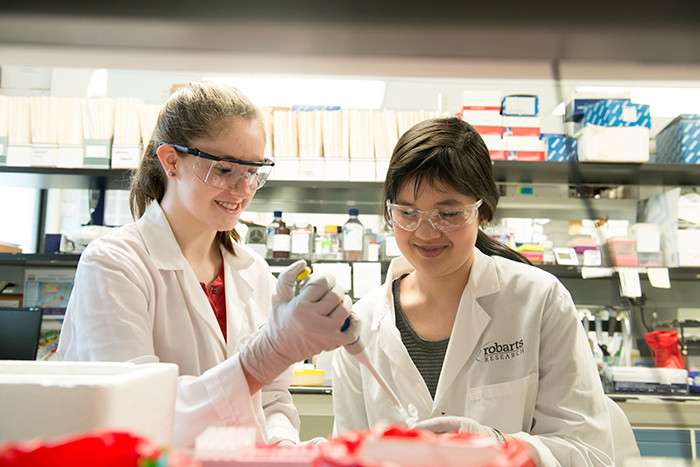'Geek thing' serves as perfect outreach

While many of her high school peers relaxed during March Break, 16-year-old Jessica Bennett was studying in a genetics lab half-way across the country.
The Wolfville, N.S., resident was a Gene Researcher for a Week in Dr. Robert Hegele's lab at Robarts Research Institute. She was joined by fellow high schooler Sarah Scott, 17, from Sarnia, Ont.
"I'm interested in finding out about the genetic causes for diseases, so the opportunity to learn in the lab environment was definitely worth the three-hour flight," Bennett explained.
A week-long program for students in Grades 11 and 12, Gene Researcher for a Week is organized by the Canadian Gene Cure Foundation. The foundation selects students who have a curiosity for science and human genetics.
About 40 labs across Canada participate, giving students the opportunity to witness research in action and gain hands-on experience with basic science experiments.
Bennett and Scott took part in extracting and sequencing DNA and calculating genetic risk for disease, as well as clinical work and university classes.
These activities were certainly a hit with the two high schoolers. "We got to extract our own DNA from saliva which was really cool," Scott said. "And everyone in the lab is so passionate about their work – it's inspiring."
Bennett agreed. "I was really fascinated by the whole process coming together to detect gene mutation," she said. "We also got to learn about the undergrad research projects, which made me realize all the different ways you can go with genetics research."
Both aspiring scientists are planning to study general science at the postsecondary level.
The opportunity to positively influence these types of career decisions is why Hegele remains committed to the program. His lab has been involved for 15 years, stemming from his work with the Canadian Genetic Diseases Network.
"With the network's mandate of education and outreach, we wanted to connect with students at a younger level," he explained. "It's a fun, 'geek thing' for top high school students to travel to a lab, and the experience is always very gratifying for everyone involved, including graduate students and senior lab members."
With a record number of applicants this year, Hegele is hopeful the program will continue to grow. "For any of my young colleagues that are just starting out, this is a wonderful opportunity," he said. "It's a chance to get out into the scientific community, attend lectures and see what it's like being a science undergrad."
And investing the lab's time and efforts to encourage youth in science has proven to be worthwhile. many former Gene Researchers go on to achieve research and career success – one student recently landed a position with Health Canada and credits the program with putting her on the right path in science.
Recognizing and facilitating this potential is the underlying motivation for the program. The foundation website acknowledges these "emerging scientists may be the ones who will make the ground-breaking discoveries in the lab, and translate these findings to improved patient care and treatment."
Provided by University of Western Ontario

















